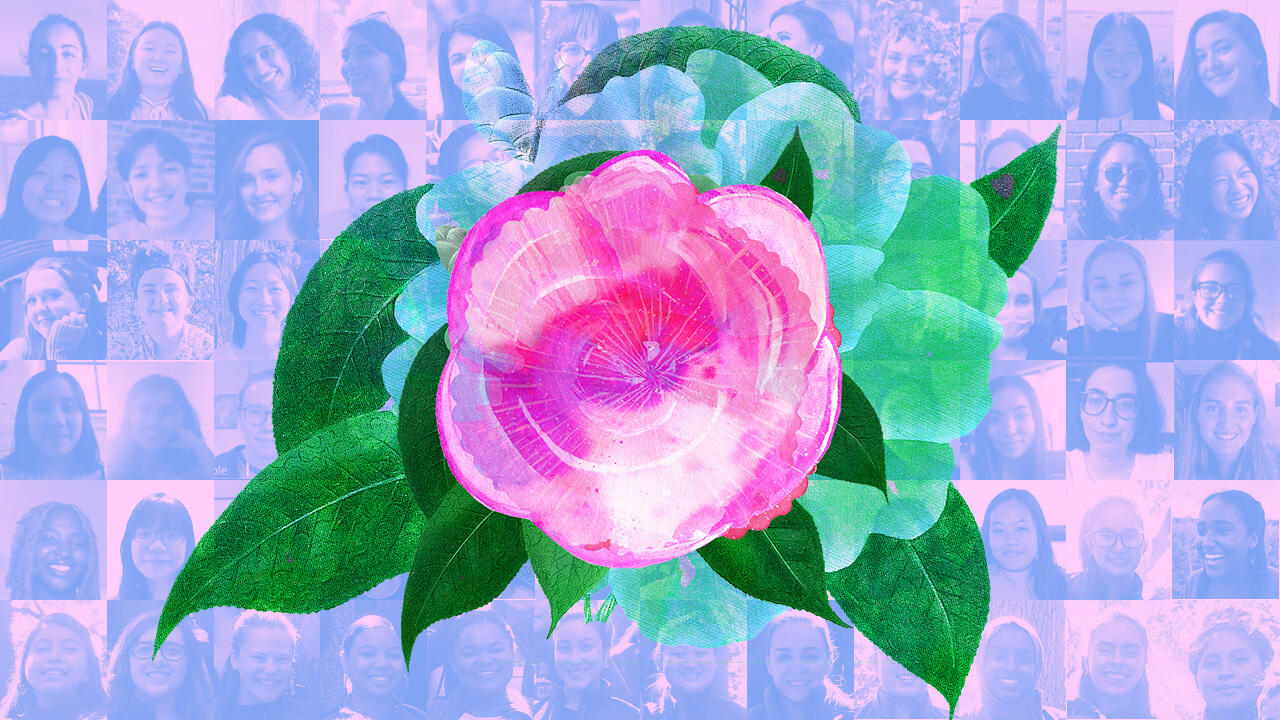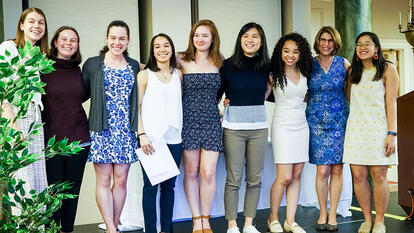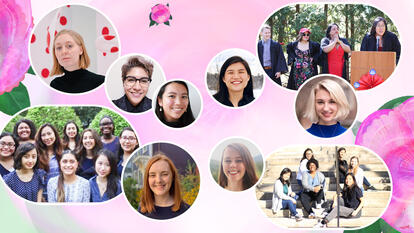
Student Leaders Who Demonstrated Resilience Honored with 2021 Camellia Awards
In a year when so many aspects of campus life shifted as a result of the pandemic, students’ commitment to service and leadership remained steadfast. On May 21, the College recognized many of their individual and collective efforts with the fourth annual Camellia Student Leadership Awards. Named for the camellia tree given to the College by its founders, Henry and Pauline Durant, the awards honor leadership and service on campus, in the Boston area, and beyond across three overarching disciplines: self-awareness, engagement with others, and connection to purpose.
“College students, as a demographic, have a lot of power and voice, thinking back to Student Nonviolent Coordinating Committee and the civil rights movement,” said Iris Haastrup ’22, who received the Resilience in Leadership Award for starting the South Side Grocery Pick Up initiative, a Chicago-based project offering groceries, hygiene products, and hot food to those in need last summer during the widespread social justice protests. “That voice has to be spread to the most vulnerable people in our communities that don’t have access to the resources that Wellesley provides and that can be taken for granted. Having this form of leadership acknowledged at Wellesley shows other students that there is a world outside of Wellesley and academia that we can have an impact on.”
The recipients of the 10 awards, which honor individual leaders as well as groups, are chosen from a pool of nominees submitted by students, faculty, and staff by Carol Bate, associate dean of students, and a team of representatives from Student Life and Career Education. Individual award-winners receive a custom-designed sterling silver camellia pin, and winning student groups have their names engraved on a permanent plaque in the Lulu Chow Wang Campus Center and receive a $100 grant to promote their work.
“The longer I’ve been at Wellesley, the more I’ve become convinced that the most important work that people do is, fundamentally, interpersonal.”
Neeraja Deshpande ’23
“I think it is important to recognize those who commit to enacting change on campus, especially if they are students of color,” said Marglucy Omwega ’22, part of the team of Community Inclusion Facilitators, which received this year’s Inclusive Leadership Award. “There are so many leaders on this campus, many going unrecognized. I think one of the many goals of building upon community and leadership at Wellesley is increasing and shining a light on students of color, but also giving them the resources they need to succeed and enact change.”
Shez Jafry ’21, a member of Wellesley for Boston Children’s Hospital’s executive board, felt “humbled and honored” that the group was collectively given the Community Partnership Award. “Over the last year, we consistently met to brainstorm ways in which we could make volunteering more accessible for students despite COVID-19 restrictions, while also catering our activities to the needs of children who are in hospitals right now,” Jafry said. “This commitment to the betterment of our community took a lot of dedication on our club community’s part, so it is exciting to honor the work of all of these volunteers.”
Lia James ’21 earned the Team Leadership Award for her efforts to bring virtual theater performances to the Wellesley community. “Coming on as Upstage president in the summer of 2020, looking ahead to a school year without access to a physical theater space, I felt incredibly nervous about the upcoming year, and I worried that our performance-based org wouldn’t make it through the pandemic intact,” she said. “Receiving this award and reading my citation brought back all the transcendent feelings of successfully producing a virtual, COVID-safe show, made possible by the hard work of a great many people. It was a reminder that the hard work of Upstage’s E-board had made a difference in our community.”
“The longer I’ve been at Wellesley, the more I’ve become convinced that the most important work that people do is, fundamentally, interpersonal,” said Neeraja Deshpande ’23, part of the team of students from Renew Wellesley and ECON/ES 199 that was granted the Collaborative Excellence Award for helping to bring about Wellesley’s decision to prohibit new investment in fossil fuels. “It may not be traditionally defined as leadership, but the day-to-day initiatives students take to treat others with kindness, respect, and love are a big part of what make the campus function: seniors checking in on confused first-years, students being a shoulder to cry on for others when things aren’t going so well, orgs that are supporting students in a time of crisis, students helping each other with problem sets and essays in class. Grand gestures are good and all, and big projects are fun to work on. But in terms of what’s most valuable, and what’s most needed, I rarely think of the big and recognizable ways we can all go off and save the world, so to speak, but of the little, hidden ones in which we can all, in some capacity, be there for one another.”


